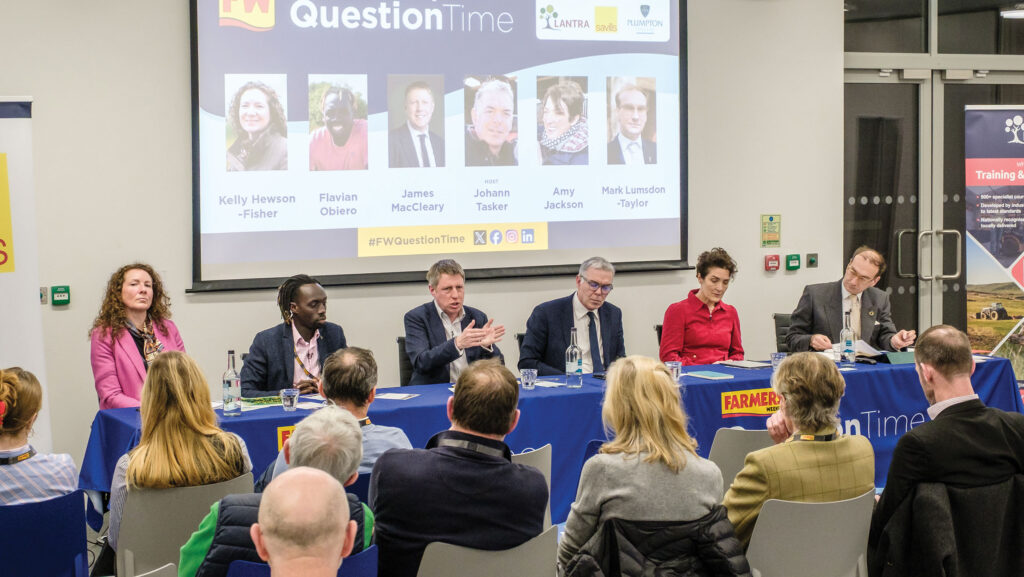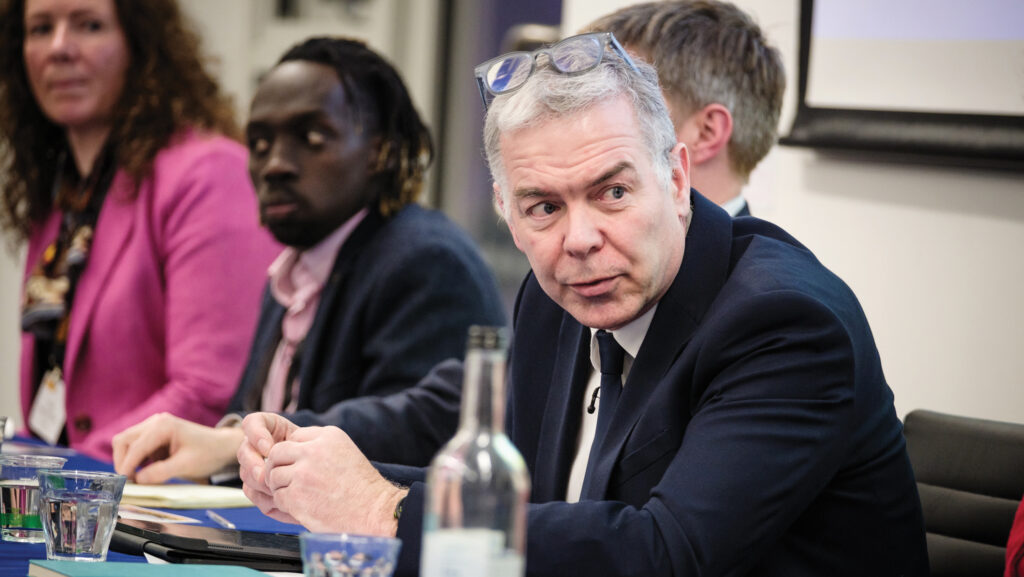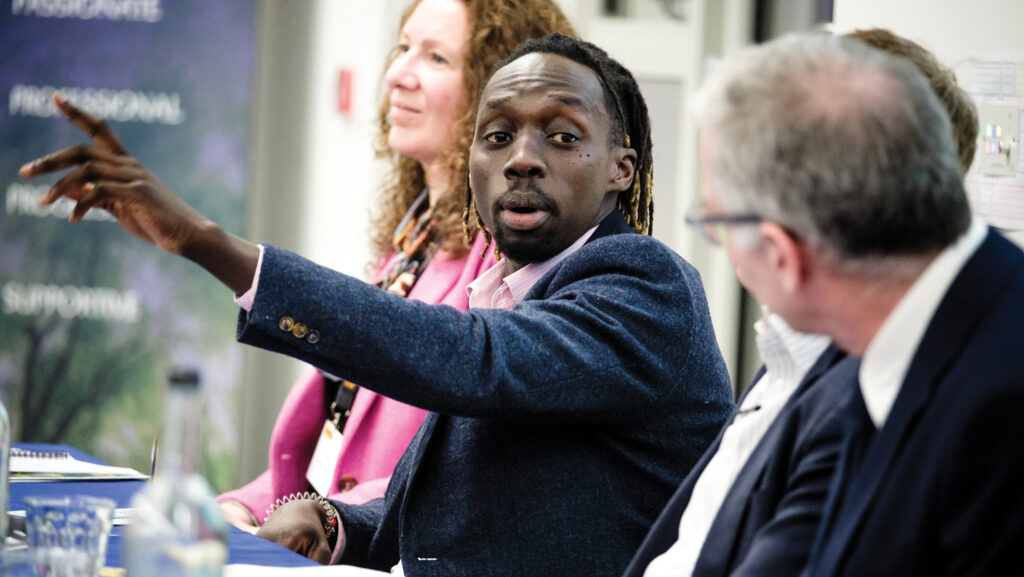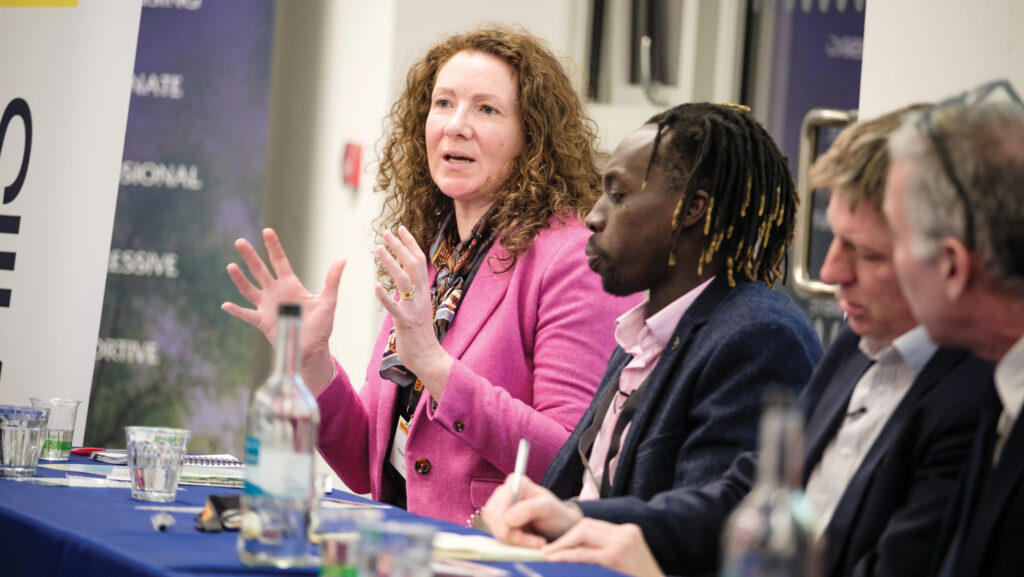Inheritance tax in the spotlight at FW Question Time
 © MAG/Colin miller
© MAG/Colin miller How a change of tactics is called for as the Treasury digs in over inheritance tax was the key focus at the latest Farmers Weekly Question Time event, hosted by Johann Tasker at Plumpton College.
Other topics discussed included farm subsidies, showcasing agri-tech, agricultural-related infrastructure and farmer mental health.
The expert panel included Kelly Hewson-Fisher of Savills; Dr Amy Jackson of Oxtale PR, specialising in agricultural communiations; Hampshire pig farmer Flavian Obiero; James MacCleary, Liberal Democrat MP for Lewes, and Mark Lumsdon-Taylor of the Rural Policy Group.
See also: NFU’s ‘clawback’ IHT proposal to Treasury could raise £686m

Host Johann Tasker © MAG/Colin Miller
Inheritance tax
What is the likelihood of the Treasury softening its stance on inheritance tax?
The majority view from the panel was that any change of policy is looking increasingly unlikely, with the Treasury digging in on the issue.
Kelly Hewson-Fisher of Savills said that, until the farm unions and other stakeholders had their meeting with Treasury officials on Tuesday 18 February, she had believed a compromise could be found.
“Tweaks might have been made to take into account an ageing generation, or to raise the £1m threshold (below which agricultural property relief would still apply),” she said.
“But the messages that have come out from that meeting last Tuesday have been very clear – the door is firmly shut.”

James MacCleary, Lib Dems MP for Lewes © MAG/Colin Miller
Liberal Democrat MP James MacCleary agreed, saying the fact the Treasury had invested so much political capital already in defending its plans would make it very hard for them to back down now.
“The whole issue is an example of decisions being driven by Treasury to raise money designed by people who have no idea how rural businesses and the farming industry work,” he said. It would not raise much money, but would do enormous harm.
Mark Lumsdon-Taylor of the Rural Policy Group was also downbeat in his expectations, but did urge patience.
“The legislation will go through a consultation, and it will go through Parliament where all sorts of people will have a view on it,” he said.
“So let’s just wait and see what it looks like then and that will be the opportunity to request and effect change, through your MPs, to see where we can ‘de-blunt’ the instrument.”
What should the sector’s tactics be going forward?
Communications expert Amy Jackson said she believed the time had come to move on from farmer protests.
“The message from government has been quite categorical, so what do we have to gain from continuing to protest?” she asked.
Stepping up the protests, or interrupting food supplies as some were suggesting, would be “a really dangerous thing to do” in terms of jeopardising farming’s reputation.
The time had come to build bridges with the public and major on the systemic lack of profitability in the industry, she suggested.
“I think we should focus on that, and park the protest side of things, which is entering diminishing returns territory.”

Pig farmer Flavian Obiero © MAG/Colin Miller
Hampshire pig farmer Flavian Obiero agreed the time had come to start focusing on the constant squeeze on margins in the food chain.
“Why are we not trying to look more at how we can make our businesses viable?” he asked.
“If you had a viable business, then you wouldn’t really be panicking about these [IHT] costs. So rather than having a load of tractors kicking up about IHT, why don’t we have that for supply chain fairness?”
Mr Lumsdon-Taylor urged other non-agricultural businesses to get involved in lobbying against IHT, as they too would be hit.
They should come at it from a slightly different angle, he said, “because the government won’t change their stance based on the rhetoric that is currently there”.
Audience reaction
Asked for a show of hands as to whether they believed the Treasury might back down on IHT, the audience was almost unanimous in the view that it would not.
Audience comment
Adrian Pearce of chartered accountants Kreston Reeves said the likelihood of a government change of heart was minimal, and smaller family farms were especially vulnerable given their marginal profitability.
Despite being offered 10 years to pay any IHT liability, they would still not be able to do so, which would result in farms being broken up.
“It is the law of unintended consequences. The big landowners, which the government is looking to affect, will probably be able to live with this. It is a different story for smaller units in the South West, or in Wales, or in the North.”
Robin Hobson of consultants Laurence Gould urged a more proactive approach towards government, suggesting British farmers were too “nice” and that French-style direct action might now be more appropriate.
Farm subsidies
How can farm businesses overcome the loss of the Basic Payment Scheme?
Perhaps surprisingly, but many on the panel viewed the phase out of the Basic Payment Scheme (BPS) by government as something of an opportunity.
Ms Hewson-Fisher acknowledged that, historically, the BPS had accounted for a significant share of most farms’ profitability.
“But having BPS has maybe undermined our businesses,” she said, asking whether it had stifled progression in agricultural businesses and allowed them to become complacent.
The sector had also had warnings for some time that BPS was going to decrease.
Savills had, therefore, recommended five ways of coping with the change, namely:
- Focus on improving efficiency and innovation;
- Look to add value;
- Work with others in the food supply chain;
- Consider diversification opportunities;
- Make the most of alternative public and private funding streams.

Kelly Hewson-Fisher, Savills © MAG/Colin Miller
Mr Obiero said the trick for him was to take every opportunity to engage with the public, selling direct where possible and securing customer loyalty by forging great consumer relations.
Dr Jackson agreed that working with the public was something every other business in the country had to do.
“Isn’t losing BPS an opportunity to liberate what we are doing?” she said. “This could be our ‘New Zealand moment’ to actually start to do things differently.
“As far as BPS is concerned, I’ve always thought it is just a subsidy for cheap food. Farmers hardly ever see any of the benefits of BPS, because all I see it doing is to keep the price of food down.”
Mr Lumsdon-Taylor suggested businesses could go one of two ways – either become niche specialists in what they do, or consolidate to achieve economies of scale.
There were opportunities, he added, including tapping into other forms of support, but there was also a need to change the narrative.
“Why is aviation doing so well in this country? It’s because they have got their language right. They are talking up the importance of a third runway at Heathrow, and of the UK being a hub – and government is listening.”
Agriculture should do the same, by suggesting solutions rather than problems, he said.
Mr MacCleary, however, was less accepting of the changes being imposed with the steep cuts in BPS, which he suggested had been slipped in through the Autumn Budget and had not been spoken about enough.
“I have a problem with referring to them as subsidies at all,” he said. “I see them as investments, and I see public money for public goods as being a fundamental principle of government.”
While diversification was an option for some, he added, it was almost invariably the larger farms that were doing it.
That still left small family farms at risk, with a chance that low cost “factory farms” would replace them.
He dismissed the suggestion that farmers had become complacent or lazy because of subsidies, and viewed the removal of BPS as “really damaging” in terms of food security.

Audience at Question Time, Plumpton College © MAG/Colin Miller
Agri-tech
How can we better showcase agri-tech to get new entrants into farming?
According to Dr Jackson, the whole industry has a “brand problem”. “Unless we deal with that, we’re not going to pull the people we want into the industry,” she said.
One example came from work Dr Jackson had done with the Royal Association of British Dairy Farmers into labour availability, which showed how reluctant domestic workers were to enter the sector.
The industry really needed to focus on its branding, and put in resources to do so. “As ever in farming, we’re all acting in our little silos. We need to work together as an industry and to put proper funding in.”
Ms Hewson-Fisher agreed the industry needs to shout louder about the fantastic career opportunities that are available in agriculture.
There were multiple demands on land, for producing food as well as environmental delivery, and reaching the government’s goals for a decarbonised power sector.
“We’re going to need all these skill sets within our industry – and we need to showcase that all those skills are important,” she said.
“It’s great going to careers fairs, but it’s about making sure all those advisors have that information to hand.”
Mr Obiero said more use should be made of social media to get pro-farming messages across to younger people. The industry also needed to widen the net, rather than relying on the same colleges and universities to provide the workforce.
Audience comment
Jeremy Kerswell, principal of Plumpton College, cited a number of things his establishment had focused on to encourage more people into the food and farming sector.
These included:
- A significant investment in facilities and technology
- Taking the pro-farming
- Pro-tech narrative to schools
- Parents and communities
- Building partnerships with other companies in the supply chain
- Inviting secondary school teachers to the college to learn more.
“This has had a huge impact, not just on the volume of students that we’re attracting, but the background of those students,” he said. “We’ve seen a doubling of agriculture student numbers in the last three years.”
Infrastructure
If there was a budget for agricultural-related infrastructure in the South East, how would you spend it?
Ms Hewson-Fisher said the greatest need was for better water provision.
“Here in the South East we have huge potential,” she said. “We’re only 54% self-sufficient in veg, 17% self-sufficient in fruit. There are huge opportunities as we also have the climate and the soils, but water scarcity is a huge concern going forward.
“If we do nothing between now and 2050, we’re going to need 5bn litres/day, driven by population growth, climate change, environmental degradation.
“The Environment Agency is already looking at abstraction licences. We need to focus on water infrastructure to increase productivity.”
Mr MacCleary agreed investment in water infrastructure was needed, not just for securing future availability, but to deal with flooding, that was making crop growing and cattle grazing impossible in some parts of his constituency.
For Mr Obiero, the priority was more abattoirs, following the recent closure of yet another facility in Hampshire.
Instead of sending his finished pigs locally to Farnborough, he now had to send them to Chippenham in Wiltshire, which was having economic, environmental and animal welfare consequences.
Mr Lumsdon-Taylor said his priority would be digitisation and broadband. “That is the future of agriculture and food, and you need fast connection.”
Mr MacCleary said this was one of the most prominent issues in his email inbox, affecting not just agriculture, but the whole rural community. It was a massive limiting factor for growth.
Audience comment
Local dairy farmer Tom Gribble said the lack of a small local abattoir had jeopardised his direct selling of lamb to local pubs and butchers.
“We also need somewhere to process grain,” he added. “Every tonne of grain I grow down here is worth £20 less than in Lincolnshire because we have no infrastructure here in the South East.”
Wellbeing
Are farmers happy?
The majority view from the panel was that farmers are not in a good place. “There is a sombre mood across the industry,” said Ms Hewson-Fisher. Confidence had taken a knock, and that was being driven by uncertainty.
Mr MacCleary went further, saying there was a mental health crisis in farming, as evidenced by the higher than average suicide rate in the sector.
“It is a crisis that needs to be spoken about because, until you talk about mental health, it’s impossible to actually address it,” he said.
“We need, collectively, to tell a better story, and there needs to be better support for those who are struggling – especially men who are bad at talking about their mental health.”
Mr Lumsdon-Taylor highlighted the need for everyone to support people in that situation.
“Happiness comes down to whether you feel secure, safe and whether you’ve got a future. I think the industry as a whole has got a future, and is hopeful. If we change the narrative, people will feel happier. It’s infectious.”
Expert panel
Kelly Hewson-Fisher, director and head of rural research, Savills
Kelly Hewson-Fisher is a conscientious and professional leader with 20 years’ experience in the environment, food and water sectors, with a practical farming background.
Dr Amy Jackson, director of Oxtale PR
Having gained a PhD in public perceptions of farming, Amy Jackson uses research to improve how we manage reputation in agriculture.
Flavian Obiero, tenant pig farmer and apprentice butcher
A recent council farm tenant who markets produce direct to consumers and local businesses. Flavian Obiero is an advocate of diversity in British agriculture.
James MacCleary, Liberal Democrat MP for Lewes
Striving to be a strong, local voice for his community, James MacClearly is also campaigning to stop sewage dumping in rivers and coastal waters.
Mark Lumsdon-Taylor, founder and president, Rural Policy Group
A corporate financier and accountant with a special interest in food and farming. He believes sustainable finance should underpin businesses.
